
From left, at the Peace Palace, Georgia Law’s Global Governance Summer School students Saif Ahmed, Mills Culver, Bryant Oliver, Maddie Neel, Frances Plunkett, Brooke Carrington, Hanna Karimipour, and Caroline Harvey
THE HAGUE – Briefings from two eminent international law judges anchored the conclusion of our 2018 Global Governance Summer School (prior posts).
This morning, students heard from Sir Christopher Greenwood, a Briton who serves as a member of the Iran-United States Claims Tribunal. Though a presentation accented by anecdotes, he explained the history of US-Iran relations that led to establishment of the tribunal in 1981, the work of the tribunal over the last several decades, and its pending cases.
The presentation by Judge Greenwood, who had served from 2009 until early this year on the International Court of Justice, followed presentations at the latter court yesterday afternoon.
Most notably, the Honorable Joan Donoghue of the United States, one of the ICJ’s 15 permanent judges, spoke yesterday with students, both about the melding of the common and civil law systems in the court’s procedures and about the challenges of judging in the international context.
Also at the ICJ, Julia Sherman, a Judicial Fellow who works with Judge Donoghue, provided a tour of the ICJ’s headquarters, the 105-year-old Peace Palace. Sherman led students through the life cycle of an ICJ case, and also gave overviews of some recently decided ICJ cases.
Our summer school had started yesterday at the Special Tribunal for Lebanon, where representatives of the various court organs spoke to students. They included: Kirsten Calhoun, a Legal Officer in Chambers, who gave an overview of the tribunal’s history and mandate, as well as an introduction to the applicable law; Peter Koelling, Chief of the Registry’s Court Management Services Section; TJ Adhihetty, Trial Counsel in the Office of the Prosecutor, who walked students through the prosecution’s case in Prosecutor v. Ayyash et al., focusing on call data records; and Marie-Pier Barbeau, Legal Officer in the Legal Advisory Section of the tribunal’s Defence Office, and Jason Antley, Associate Legal Officer representing the interests of defendant Salim Jamil Ayyash, who discussed the challenges of representing the named defendants in absentia.
The Global Governance Summer School having come to and end, some students began or continued Global Externships, while others traveled in Europe before returning to the United States.









 The group started the day at the International Court of Justice (ICJ) for an audience with
The group started the day at the International Court of Justice (ICJ) for an audience with  In the afternoon, the group visited the International Criminal Court (ICC), located on the dunes near The Hague’s North Sea coast. Student first had a meeting with Prosecutor
In the afternoon, the group visited the International Criminal Court (ICC), located on the dunes near The Hague’s North Sea coast. Student first had a meeting with Prosecutor  The second audience at the ICC was with the
The second audience at the ICC was with the  Students also had the opportunity to view the
Students also had the opportunity to view the 